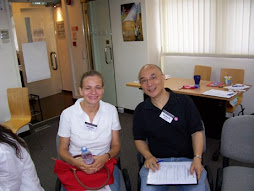Team reports/pitches are commonplace in a corporate
environment and executives and managers present in this manner often without
realizing there are special tactics to make this type of presentation more
effective.
I’ve worked with clients on specific presentations with a
targeted outcome and also with executive teams on mastering their pitches. I
have seen how far more powerfully impactful and convincing a team presentation
can be, if done properly. The idea of presenting with a team may be comforting
for some, as the pressure is not entirely imposed upon the individual and it
feels safer to stand up with your trusted team members. However, it can totally
backfire if the team is not aligned on the message or have not prepared
properly.
From my work over the years with team sales pitches and
project presentations, here are some basic guidelines that will be useful for
the next time you are presenting as a team.
Join our next Dynamic Presentation Skills Workshop on July 7, 2012.
Join our next Dynamic Presentation Skills Workshop on July 7, 2012.
1. Achieve Team
Alignment – it may seem glaringly obvious but many teams go into
preparation and presentation mode “assuming” everyone is aligned on the
objective. There may be a complete disconnect from Joe the Designer to Frank
the Finance Manager on the outcome of the presentation or they may have their
own personal agendas. Make sure that the team discusses FIRST AND FOREMOST the
objective of the presentation and the desired outcome. After a discussion where
everyone has a chance to voice out, achieve alignment and commitment.
I once coached a very senior executive team on a high
profile pitch and before we edited the slides or worked on each speaker’s
presentation, I proceeded to get alignment on the objective. They thought it
was a strange start to the process and after a one-hour discussion when the
entire team became clear on what the desired outcome was, they exclaimed that it
was inspiring and one even said, “It was a revolutionary process!” That was
when I realized that many teams miss out on this step.
Your audience will feel the solidarity and consistency in
your team’s message if you are all singing to the same tune. Yes, so simple but
yet so often missed.
2. Identify Each Team Member’s
Strengths in Expertise, Credibility and Presentation Style. It’s a
strategic game and some tactical manoeuvring may need to take place, especially
if you are pitching for a big account or you are given only one shot to get
budget approval with the presentation.
Once you have achieved your team alignment and message,
decide on the players to present to your audience. Which expert may win the key
points, which team member has credibility or relationship with audience members
that may sway the results and who has the strongest presentation style to
open/close the presentation? Do not just slot speakers purely based on the
content.
If you have a content expert who is a poor speaker, maybe
this expert can share the key points and allow a stronger speaker to open and
close this section. If you have a strong presenter who is not a subject matter
expert, make him/her the emcee or hold the presentation format by transitioning
one speaker to the other. If you have a team member who has the credibility in the
eyes of the audience, let this speaker open the presentation and close with
strong influence. Maximize your team’s strengths and set everyone up for
success. (For additional tips on how to make a pitch, please check out: A Formula for Your Next Sales Presentation)
3. Transition Smoothly
Between Each Speaker – Again, very simple and somewhat obvious but this
often gets overlooked. Because teams sometimes may not have the benefit of time
to rehearse together before a presentation, it shows when there is an awkward
and disjointed transition between each speaker. Even if managers are trained on
presenting, many of them are not trained on how to close a presentation properly
and transition over to the next speaker for a team outcome. Individually they
may present well or better than their colleagues but for a team presentation,
this does not help to achieve the objective.
Not only should the content flow logically and smoothly,
when a speaker finishes, he/she should transition the next speaker in seamlessly
and to set them up for success. This is one guideline that seems to be a new concept
with many clients I work with. They believe that their job is to deliver their
presentation smashingly but this does not extend to ensuring their colleagues
also do the same. It’s a radical concept that not only do they have to look good;
they have to make their team members look as well!
One final simple tip on this guideline is to manage the
audio/visual materials, handouts, slides, props, and other presentation
materials in advance. It is very unprofessional and looks very ill-prepared
when each speaker needs an extra 5 minutes to plug in his/her laptop. Make sure
it’s all consolidated in one device and a helper is managing all the visual
aids/materials. The speakers have enough to focus on without also having to
worry about the slides being in place or the videos are cued up properly.
Hope you will be able to benefit from these simple tips in
your next team presentation. If you have a specific question, please direct
your inquiry to presentation_tips@biz-results.net
or review our webpage for other articles and tips on effective presentation
skills.
























































































































































































































































